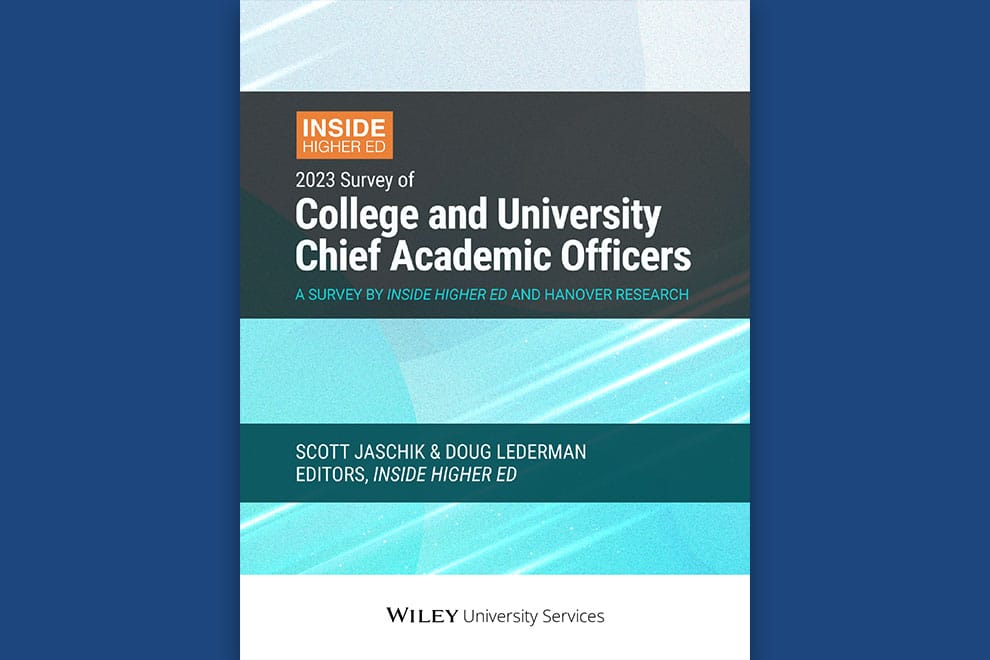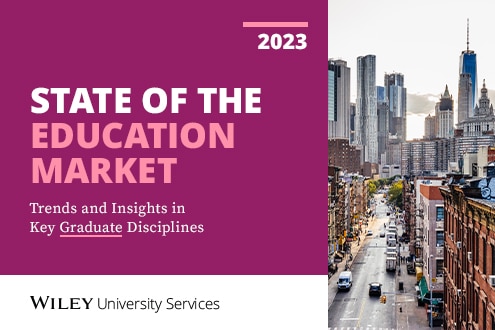Online degree programs are now a common offering at colleges and universities across the country. But if you’ve had concerns that these online programs will eventually replace or decrease enrollment in your on-campus programs, the good news is that there’s already plenty of evidence showing that this is not the case. Instead, the relationship between on-campus programs and online or distance learning programs is more of a symbiotic one.
For example, data from one of Wiley University Services’ institutional partners, a mid-size regional university, demonstrates how an online MBA program has actually supported the university’s on-campus MBA program. After launching an online MBA program in 2014, the institution saw steady enrollment growth over the next two years. In addition, the on-campus MBA program’s enrollment numbers, which had been declining, began to stabilize and eventually show a slight increase.

Online Programs Engage Students Who Would Not Enroll On-Campus
Market research2 also shows that the total number of graduates from both on-campus and online programs for schools that offer an online MBA are growing at a rate of 2 percent a year. In comparison, schools that did not offer an online MBA option showed a decrease in enrollment at an average rate of 8 percent per year.
This phenomenon is not limited to business programs, as we see from the effect of adding an online Master of Science in Nursing–Family Nurse Practitioner (MSN-FNP) degree2:
- The total number of graduates (on campus and online) from institutions that offer an online/distance MSN-FNP degree has grown 177 percent since 2012.
- These institutions produced 54 percent of the total number of MSN-FNP graduates in 2016, up from 29 percent in 2012.
- Institutions that only offer an on-campus MSN-FNP without an online/distance option have lost market share, having owned 71 percent of the market in 2012, and now owning only 46 percent in 2016.
This research suggests that traditional universities can increase enrollment when students have the option of taking an online program in addition to on-campus programs. It also suggests that those who do not go online risk market-share losses, as students will go somewhere else to be online.
Online Programs Open Enrollment for Working Professionals and Non-Local Students
There are several reasons why online programs are not undermining on-campus programs:
- Prospective online students tend to decide on the online modality first, before they make any decisions about which institution to attend. The flexibility and convenience of online learning are the most important factors for these individuals. If you don’t offer an online program, they won’t consider your institution – instead, they’ll consider other institutions that do.
- The majority of individuals enrolling in online programs are adults or non-traditional students who are going back to school, usually while holding a full-time job. They may want to develop additional knowledge or credentials to advance their careers, or they may need new skills to keep up in their field. Online programs offer the convenience to allow these working students to fit classes in around their work schedules and personal obligations.
- Online programs complement on-campus programs by extending their market reach to non-local students, reducing the barrier of student location. These potential students may very much want to attend a specific university or enroll in a certain program but are unable or unwilling to uproot their families and disrupt their careers.
- Online programs may expand your local student base as well, as individuals who may have been reluctant to enroll due to time and schedule constraints may appreciate a more flexible option.
- Finally, because online programs allow for students from virtually anywhere to enroll, it’s an important asset that helps promote the school’s brand, both nationally and internationally. This results in greater brand recognition and raises the school’s profile, all of which leads to potentially greater on-campus student enrollment in the future.
In addition to providing additional student demographics with new learning opportunities, online programs offer substantial benefits to institutions, including potential growth in their campus programs and increased brand awareness. Colleges and universities that do not offer online options in addition to campus programs may even find their enrollments declining.
To learn more about other commonly asked online education questions, like how to offer programs with fieldwork requirements online or advice for faculty teaching online for the first time, visit our Resources page.
Sources:
1Wiley University Services data
2The Integrated Post-Secondary Education Data System (IPEDS)

















